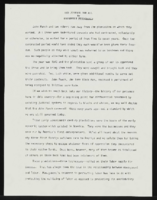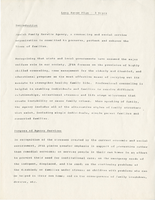Search the Special Collections and Archives Portal
Search Results
McLean, Charlie
Charlie McLean was born in 1932 and raised in Scotland to a family of musicians. McLean’s dad started teaching him to play the saxophone when he was eight years old. By the time he was nine years old, he was performing in his father’s band, which included playing concerts for the munitions workers during World War II. When he was 15, McLean’s family migrated to the United States. Following graduating from high school, McLean was drafted and played with the Non-Commissioned Officers (NCO) Club Band.
Person
Washington, Hermina, 1957-
Hermina Washington was born December 23, 1957 in Henderson, Nevada. To take advantage of emerging opportunities for African Americans, her parents migrated from Arkansas to Las Vegas, Nevada, joining several extended family members already settled in the city. Growing up during the Civil Rights Movement, Washington was surrounded by strong, inspiring role models, including her grandmother and educators.
Person
Las Vegas African American Community Conversations round table interviews
Identifier
Abstract
The Las Vegas African American Community Conversations is a four-part conversation with local Las Vegans. The first part of the round table is moderated by Trisha Geran with a central theme of "Migration, Work and Community Emergence." The panelists discuss the early history of the African American community in Las Vegas, Nevada. They also discuss how and why their families moved to Las Vegas, most citing the economic opportunities as a major factor. The participants share their personal histories and family histories building up the African American community in downtown Las Vegas and the Westside. The second part of the round table is moderated by Sonya Horsford with a central theme of "Education, Economy, and Integration." The panelists discuss the Clark County School District pre- and post-integration. They discuss the hardships of the Sixth Grade Center Integration Plan on the African American community as well as discussing the differences in the school facilities. The round table participants also discuss the social services and social programs and the history of those programs from the African American perspective. They also discuss civic involvement and the various civic groups started by the panelists, and share discrimination they faced.
The third part of the round table is moderated by Claytee D. White with a central theme of "Civil Rights and Entertainment." The panelists discuss the racism and segregation present in Las Vegas and discuss how African American community leaders worked to integrate African Americans into the Las Vegas community. They discuss the 1969 riots in detail, and discuss African American entertainers and the entertainment industry. They share personal experiences working in the entertainment industry and discuss the importance of the local unions, such as the Culinary Workers Union Local 226, the International Alliance of Theatrical Stage Employees Local 720, and their contributions to the unions. The fourth and final part of the round table is moderated by Rachel Anderson with a central theme of the "Early African American Legal Community." The panelists discuss the foundations of the professional legal community in Las Vegas, noting the contributions of Charles Keller, Dr. William Bailey, and the Reverend Marion Bennett as driving forces for civil rights activism in Las Vegas. They share their experiences growing up in Las Vegas facing discrimination and segregation. Lastly, they share the changes they have seen and how both the legal and African African communities have grown.
Archival Collection
Public School Principalship Oral History Project
The Oral History of the Public School Principalship project, initiated in 1986, contains interviews with former elementary, middle, and high school principals. Conducted by Professor Patrick W. Carlton, Ph.D. and his graduate students, the documents capture the views, reminiscences, and accumulated knowledge of these veteran administrators. The collection consists of approximately 400 first-person accounts of service in public school administration by men and women serving in Nevada, Virginia, and 24 other states.
Corporate Body

Transcript of interview with Richard Caldwell by Lloyd Henderson, March 06, 1980
Date
Archival Collection
Description
Text
Pichot, Mary Kozlowski
Mary Kozlowski Pichot was born on October 23, 1939 in Town of Lake, Wisconsin to parents George and Mary Kupec. She was an American environmentalist and activist and she worked to preserve various areas such as Red Rock Canyon and Tule Springs.
Person

Transcript of Interview with Barbara Kirkland
Date
Archival Collection
Description
On a sunny day in 1946, the train from Shreveport, Louisiana, stopped at The Plaza hotel in downtown Las Vegas like it always did. But on this particular day, Atha Toliver and her only child, twelve-year-old Barbara, stepped off the train and onto the dusty Western street of Fremont. Narrator Barbara Bates Kirkland recalls that event and living in Las Vegas for most of the next seven decades during this 2004 interview. Like many others who migrated from the South, Barbara Kirkland’s mother would find employment as a maid. A friend who already lived in Las Vegas had told her of the good paying jobs as private maid. So Atha who was determined that her daughter would get an education and a finer future saw this as her opportunity to achieve this for her daughter. Later, the entrepreneurial and creative mother opened Eva’s Flower Basket, a floral shop that Barbara operates in her retirement from teaching. Barbara returned to Louisiana for her senior year in high school, attended Southern University in Baton Rouge, and then returned to Las Vegas to teach first grade at Westside School. Barbara was active in the community, was a founding member of Les Femmes Douze, involved with Zion United Methodist Church and was friends with many of the early African American community leaders at the time. She talks about these, describes various neighborhoods where she lived and about raising her own two children in Las Vegas. Barbara was a founding member of Les Femmes Douze. AKA/Akateens.
Text

"And Justice for All": article draft by Roosevelt Fitzgerald
Date
Archival Collection
Description
From the Roosevelt Fitzgerald Professional Papers (MS-01082) -- Drafts for the Las Vegas Sentinel Voice file. On Black individuals being suspects and targets.
Text

